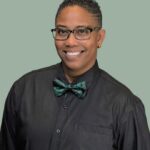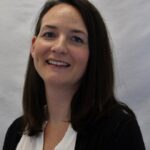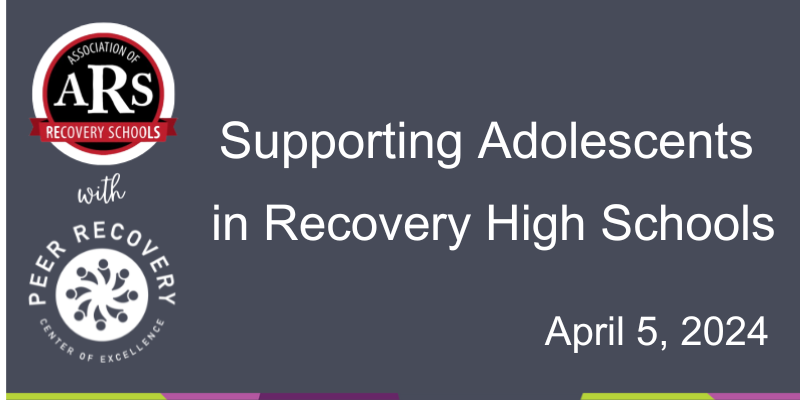The Peer Recovery Center of Excellence, in partnership with the Association for Recovery Schools (ARS), present:
Supporting Adolescents in Recovery High Schools
Supporting adolescents in a Recovery High School setting involves addressing their unique needs related to substance use recovery while also providing a supportive educational environment. In this presentation, we discuss the creation and evolution of recovery support services for adolescents within an academic setting, most notably the importance of a strong culture of peer-to-peer supports. We will explore the evidence-based research behind the peer-to-peer support model in adolescent recovery settings. Through shared experiences from the field providing peer recovery support services, presenters will share their experience building strong peer-to-peer recovery support within a school and the formulation of a “true” peer to peer recovery support that provides training to current students and gives them the opportunity to serve their high school peers while also helping to build a future workforce in the field of peer recovery.
Learning Objectives:
- Participants will gain an understanding for the need of Recovery High Schools. They will also gain an understanding of different approaches to peer recovery support and what that may look like in different Recovery High Schools.
- Participants will gain an understanding of how research supports the need for peer support in a recovery high school.
- Participants will be able to identify strategies to formulate a “true” peer to peer recovery support and student leadership training program.
VIEW PRESENTATION
(Presentation requires Powerpoint)
Supporting Adolescents in Recovery High Schools
April 5, 2024 ~ 1pm – 2:30pm ET
(12pm Central / 11am Mountain / 10am Pacific)
You may also copy and paste the URL into your browser to register: https://umsystem.zoom.us/meeting/register/tJEuceqhpjwvGtLeVKFCDjGXYze12RqESOT0
Our Presenters
 Bea Blackmon is a Licensed Master Social Worker, Licensed Chemical Dependency Counselor-I and is Vice-Chair of Association for Recovery Schools. Bea currently works for Rise Recovery as the Program Manager of San Antonio Texas’s first recovery high school—Rise Inspire Academy. Bea has years of experience working with adolescents and families helping them to navigate the struggles involved with substance use and misuse. In 2018 Bea helped to create a recovery high school taskforce composed of individuals in support of the adolescent recovery community. She led this team toward a mission to impact change in closing the gaps of continuum of care for adolescents with substance use disorders. Bea continues to expand, transform, learn, and cultivate change in adolescent recovery for students and families through her local and national leadership and guidance on the continuum of care in Recovery High Schools. Bea received a BA in Sociology and Masters in Social Work from Lake University.
Bea Blackmon is a Licensed Master Social Worker, Licensed Chemical Dependency Counselor-I and is Vice-Chair of Association for Recovery Schools. Bea currently works for Rise Recovery as the Program Manager of San Antonio Texas’s first recovery high school—Rise Inspire Academy. Bea has years of experience working with adolescents and families helping them to navigate the struggles involved with substance use and misuse. In 2018 Bea helped to create a recovery high school taskforce composed of individuals in support of the adolescent recovery community. She led this team toward a mission to impact change in closing the gaps of continuum of care for adolescents with substance use disorders. Bea continues to expand, transform, learn, and cultivate change in adolescent recovery for students and families through her local and national leadership and guidance on the continuum of care in Recovery High Schools. Bea received a BA in Sociology and Masters in Social Work from Lake University.
 Emily A. Hennessy is Associate Director of Biostatistics at the Recovery Research Institute, Associate Director of the National Youth Center on Prevention, Treatment, and Recovery, and Assistant Professor at Harvard Medical School. Dr. Hennessy was a Fulbright Scholar to Norway where she completed a Master of Philosophy in Health Promotion at the University of Bergen and focused on adolescent well-being. She completed her Ph.D. in Community Research and Action at Vanderbilt University and her postdoctoral fellowship at the University of Connecticut in the Systematic Health Action Research Program Lab. Dr. Hennessy’s research examines factors associated with health behavior change among adolescents, with a recovery capital lens that focuses on strengths and addressing system-level barriers. Her primary area of research, examining adolescent substance use disorder recovery, is funded by a K01 career development award from the National Institute on Alcohol Abuse and Alcoholism. In this work, she examines recovery capital, social networks, and stigma to understand factors that support or get in the way of adolescent recovery processes. She also has several related funded projects that evaluate the effect of specific programs and contexts, such as alternative peer groups or treatment, on adolescent outcomes.
Emily A. Hennessy is Associate Director of Biostatistics at the Recovery Research Institute, Associate Director of the National Youth Center on Prevention, Treatment, and Recovery, and Assistant Professor at Harvard Medical School. Dr. Hennessy was a Fulbright Scholar to Norway where she completed a Master of Philosophy in Health Promotion at the University of Bergen and focused on adolescent well-being. She completed her Ph.D. in Community Research and Action at Vanderbilt University and her postdoctoral fellowship at the University of Connecticut in the Systematic Health Action Research Program Lab. Dr. Hennessy’s research examines factors associated with health behavior change among adolescents, with a recovery capital lens that focuses on strengths and addressing system-level barriers. Her primary area of research, examining adolescent substance use disorder recovery, is funded by a K01 career development award from the National Institute on Alcohol Abuse and Alcoholism. In this work, she examines recovery capital, social networks, and stigma to understand factors that support or get in the way of adolescent recovery processes. She also has several related funded projects that evaluate the effect of specific programs and contexts, such as alternative peer groups or treatment, on adolescent outcomes.
 Beth Samuelson has been an LADC for over 30 years. She has worked both in treatment centers and recovery high schools, including Insight Recovery High School in White Bear Lake, MN. She helped start a dual diagnosis treatment center and an outpatient treatment center for adolescents. Beth also assisted with opening Insight in January of 2001. Beth recently retired and is currently doing consulting work at the Alternative Learning Center in White Bear Lake.
Beth Samuelson has been an LADC for over 30 years. She has worked both in treatment centers and recovery high schools, including Insight Recovery High School in White Bear Lake, MN. She helped start a dual diagnosis treatment center and an outpatient treatment center for adolescents. Beth also assisted with opening Insight in January of 2001. Beth recently retired and is currently doing consulting work at the Alternative Learning Center in White Bear Lake.

